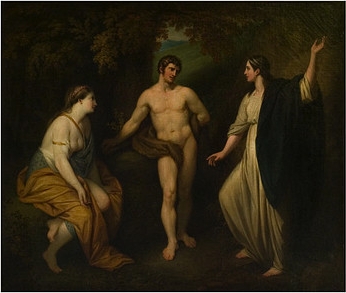Book II examines Socrates' teaching on self-discipline by looking at how Socrates taught it in the context of the major areas of civic life.
2.1 In matters of physical pleasure and pain. Socrates discusses the importance of education in endurance of difficulty in food, drink, and hard work, and in resisting pleasures with Aristippus.
2.2 In the relation of children to parents. Socrates' son, Lamprocles, has difficulty respecting his mother, Xanthippe, because of her temper; Socrates teaches him the importance of gratitude to parents.
2.3 In the relation of sibling to sibling. Chaerephon and his younger brother Chaerecrates are arguing; Socrates discusses the importance of treating one's siblings well.
2.4-10 In the cultivation of friendships. Xenophon summarizes Socrates' general teaching on the importance of having friends and treating them well (2.4), and then recounts Socrates discussing being worthy of one's friends with Antisthenes (2.5) and the importance of having worthwhile friends with Crito's son, Critobulus (2.6). We then see Socrates giving specific good advice to a friend in difficulties (2.7) and to several different friends, including Crito, in need of business advice (2.8-10).
Notable Highlights
We get several notable things in Book II. Aristippus and Antisthenes were very important students of Socrates about whom we have very little information except from Xenophon (Plato mentions both in passing, and nothing more). We also see Socrates directly interacting with his son, the only time, I think, that this happens in all the preserved Socratic writings. We also, in the Critobulus discussion, get Socrates attributing good advice to Aspasia. I will only say a few things here about Aristippus and Antisthenes.
(1) Aristippus of Cyrene is associated in antiquity with what is known as the Cyrenaic school, which were famous for their hedonism. (The doctrines of the later Epicurean school may have been partly developed to avoid commonly recognized problems with Cyrenaic thought.) It is unclear whether the Cyrenaic school was actually founded by this Aristippus or his grandson (also named Aristippus), but we see this one already linked to discussion of pleasure, and is said by Xenophon to lack discipline in such matters. Socrates leads him to consider the importance of discipline in matters of pleasure by first engaging him on an abstract discussion of the most basic form of education. In the course of discussing this, Socrates argues that voluntary suffering can be better than involuntary suffering (cp. the analogous argument in Plato's Hippias Minor). Socrates ends by recounting the Choice of Heracles, which he attributes to Prodicus of Ceos.

(2) Antisthenes of Athens also founded a school -- indeed, the stories told about him suggest that he had already founded a school when he discovered Socrates and then told all his students to take Socrates as their teacher. He wrote dialogues, of which only very limited fragments survive, but he also remained important in later philosophical history in that both the Stoics and the Cynics regarded him as their link to Socrates. In a Socratic move that we have seen elsewhere (Rival Lovers, Lysis, possibly Laches), Socrates attempts to teach someone on a topic by discussing it with someone else, in this case Antisthenes, in their presence.